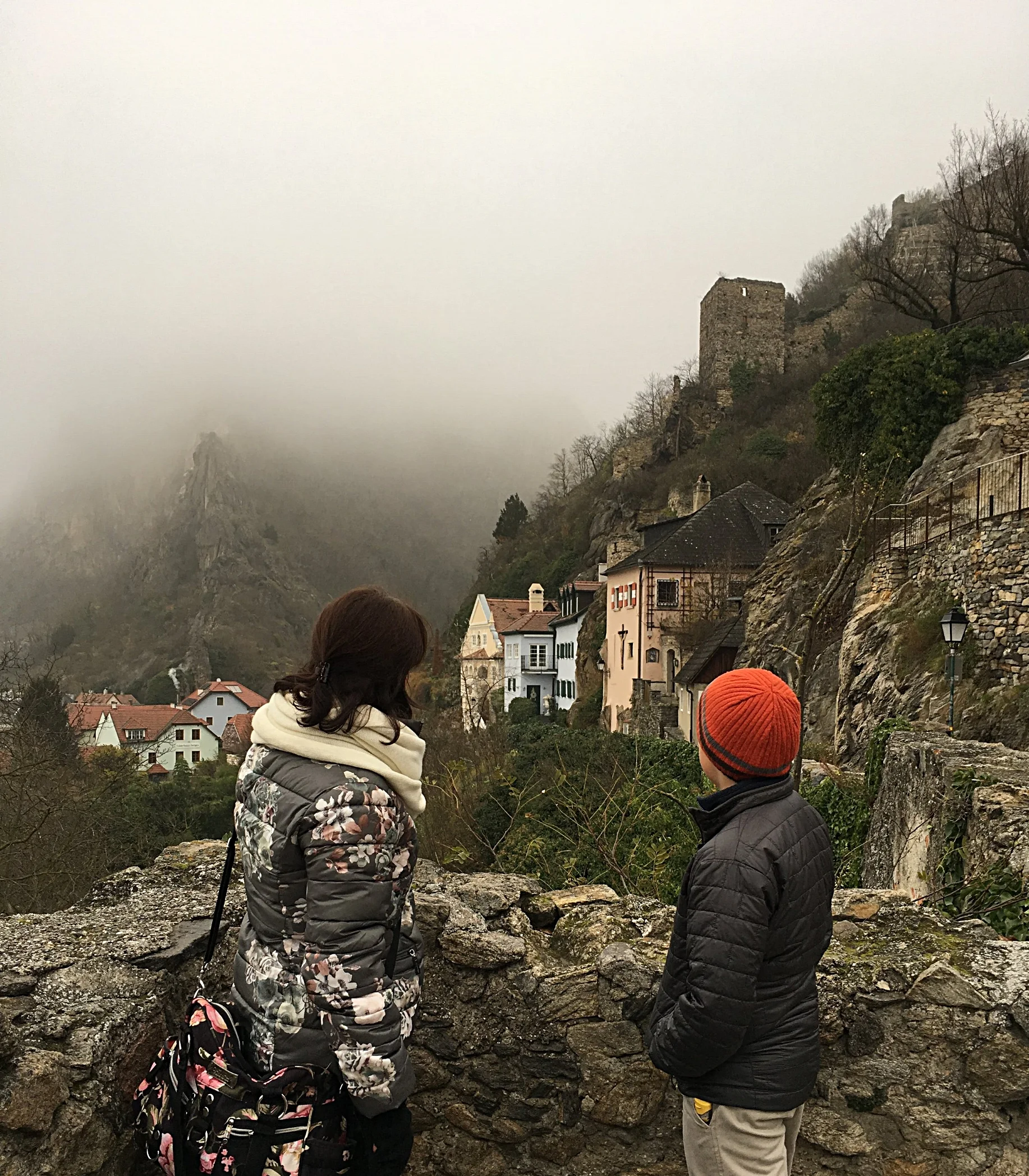Through the fog
I drove and my navigator slept…through fog so thick that we could have been anywhere, if it weren’t for the occasional glimpse of the Danube River. The Wachau Valley is a beautiful place, when you can see it. Its early fortunes were based on river, wine and taxes. The Babenburgs, celebrated as the first rulers of Austria, capitalized on this and they built a castle on the hill above the Danube to defend their territory in 976.
Leopold I was the first of the line, a margrave. His offspring would grow their holdings and stature into a Duchy and become Dukes. After the line died out in 1246, the Habspergs would follow after some bit players not worth mentioning, and grow Austria into a kingdom and then empire through a brutal combination of marital and martial arrangements. Their sign of the double eagle has so many meanings.
Durnstein is the second smallest town in Austria and is almost completely reliant on tourism to survive these days. As such, it is a ghost town in late November. The fog added to the deserted and eerie feeling. The 5-star hotel was closed for the season, as were all the shops but one. We stood on the bank of the Danube and looked uphill into the fog. If we could see it, the ruins of a castle would be just above the visible rock face…but we had to take the guide’s word for it, or Google it! Richard the Lionhearted was held there by Leopold V, as they had a disagreement during the 3rd Crusade- evidently, Richard stomped on the Austrian flag and took full credit for the victory in the Holy Land. A king’s ransom ensured his eventual release. In an odd turn of events, Leopold was excommunicated because it was evidently an offense to the Pope to detain a crusader.
We raced the setting sun through the relentless fog to arrive in Melk and experience the most splendiforous example of Baroque architecture in Austria. We were not disappointed. In the first room was an introduction to the Benedictine rules by way of an 800-year-old manuscript. It was in a temperature and humidity controlled container, so we could only read page 1…but I liked the first rule—“listen with you heart.” We read the Latin phrase in the manuscript and we saw the German phrase projected on the wall. What a coincidence. Listen in German is höre or hörch…in Latin it is, of course, some form of audi. Déjà vu Ingolstadt. When August Hörch had a falling out with his CFO and Board (this happens), he started a new company but did not have the rights to his name. Thus, he chose the Latin translation of his name and we have Audi! But I digress.
We learned about “the Season of Reason,” 10 years of the reign of Joseph II, where everything needed a purpose in society. He introduced a stunning number of progressive policies. He demanded that the monasteries contribute to society by educating children, taking care of elderly—or else be closed and put the monks to work elsewhere. Abby Melk was spared closure because of the relatively large school onsite. The country was not ready for his pace of change, and many of his reforms such as freeing the serfs, religious tolerance and reformed justice system were reversed upon his death.
John and I were a little weirded out by all the "relics" on display, you know, St. so-and-so's arm or finger, or guts. I guess my Presbyterian upbringing and current non-denominational bias was on display. The church had an interesting flanking arrangement of two corpses, and our guide said no one knows who they are so they are referred to internally as Friederich and George. We felt better about the local sense of humor :).
John and I just finished a study series on Joseph, one of the heroes of character in the Old Testament. What an example. Great servant leader. Resilient. Resourceful. Loyal. Blessed by God.
Our guide tells John, "if we could just see a little higher, that wall leads up to the castle ruins...trust me when I tell you this..."
The main façade introducing the feeling that everything you are about to see will be Baroque...
The outside of the church in Melk Abbey, viewed from a balcony that swings out overlooking the town of Melk. The fog had lifted just as it became pitch black outside.
The beautiful baroque interior. This concluded our private tour of foggy, deserted Dürnstien and equally quiet Melk Abbey. I am sure it is bustling, bright and warm in the summer- they have more than a million visitors. However, I think we saw something special, all by ourselves in the cold, wet, November evening.



